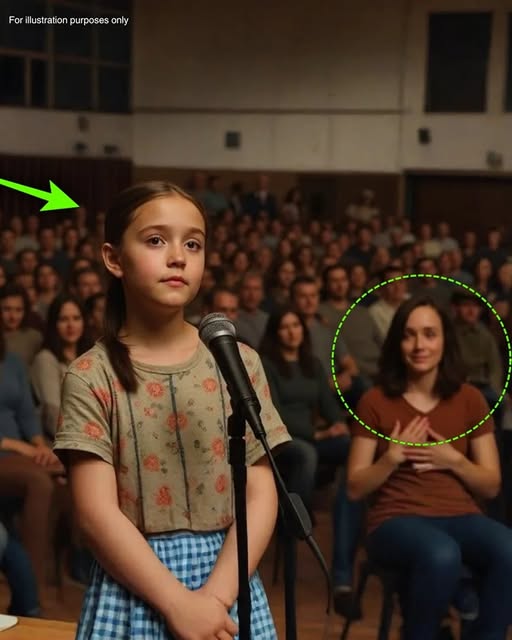The morning sunlight spilled across the cracked pavement of Winslow Elementary, casting long, golden shadows that danced between faded hopscotch lines and rusted bicycle racks. Inside, the hallway buzzed with the same Monday chatter—lunch trades, weekend gossip, and talk of the upcoming Talent Week. But in a quiet corner by the trophy case, one girl stood completely still, her hand clenched tightly around a piece of folded paper.
Her name was Sophie Lane.
To most students, she was just the girl with the patched shoes and secondhand backpack. The one who never raised her hand in class. The one who always ate lunch alone by the gym doors, her eyes fixed on the notebook she never let anyone read.
That day, something was different about her. She didn’t look taller or louder or suddenly popular. But her gaze—usually soft and distant—now held a quiet fire, like someone who had made a decision no one else knew about.
She looked at the list pinned outside the office. A long row of names: dancers, magicians, kids with karaoke tracks on USBs. And at the very bottom, she added her own. In careful, slanted letters:
“Sophie Lane – Singing (a cappella)”
Somewhere down the hall, laughter erupted.
“Wait, what? Sophie Lane? Singing?”
“Bet she’s gonna meow the lyrics. Or maybe rap with a mop!”
“Someone record it—this is gonna be gold.”
The jokes flew faster than paper planes. But Sophie didn’t flinch. She walked away, silent, her cheeks warm—but her fingers still gripping the notebook with lyrics written in pencil, faded from being traced over so many times.
That night, her mother found her in their small trailer bedroom, sitting cross-legged on a mattress barely wide enough for two. A cassette player hummed a lullaby in the background. Sophie was mouthing the words, quietly, her voice barely above a whisper.
Her mother didn’t interrupt.
She just listened.
Later, as the wind tapped gently at the windowpane, her mother spoke without turning on the light.
“You know, sweetheart… when I was your age, I wanted to sing too. But I was too scared. Too poor. Too everything.”
Sophie whispered, “I’m scared too.”
Her mother replied, “Then maybe it’s time someone sang anyway.”
No one at school knew what Sophie had been through—nights without power, mornings cleaning flour from bakery floors before sunrise. They didn’t see her rehearse under streetlamps when the house was too noisy. They didn’t know the story behind the song she chose.
But they were about to hear it.
And when that moment came—when a girl no one noticed stepped alone onto the school stage, without music, without backup, just a breath and a voice—the room would fall into a silence so deep, even the clocks seemed to pause
